What Is A SERPs Pension And Should You Opt Out Of One?
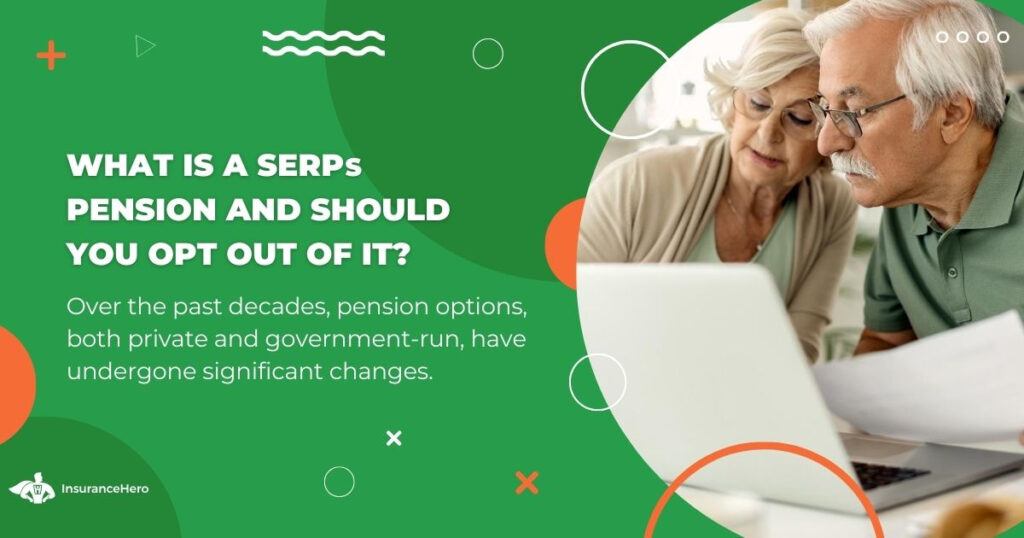
Throughout the last decades, there have been many different options for pension schemes, both private and governmentally-run.
Numerous changes to pensions have also been implemented, changing the way things work. Unfortunately, that means by the time you retire, the current landscape of pension schemes can be very different from the one you paid into and earned, and you need to be able to navigate both.
One pension you may or may not have accrued is the SERPS pension scheme. What is it, what do you need to know about it, and should you opt-out if you haven’t already? Read on to learn more.
What is a SERPS Pension?
A SERPS Pension is the “additional state pension” but is more accurately known as the State Earnings Related Pension Scheme.
This was a secondary pension you could pay into throughout your working life, which would accrue credit and contributions for an additional state pension that would pay out on top of the standard state pension.
You could only pay into it if you were traditionally employed (self-employed individuals could not contribute) and there was an earnings limit below which you could not contribute.

The SERPS Pension was essentially automatic; anyone who earned full Class 1 national insurance contributions earned credit towards the SERPS pension. However, not everyone contributed to the SERPS pension; more on that momentarily.
What Happened to the SERPS Pension?
Suppose you’ve noted the use of past tense in the above section; keep a keen eye.
We use the past tense because the SERPS pension scheme ended in 2002. It ran from 1978 to 2002 but was changed to expand eligibility and fairness in that final year.
Specifically, the SERPS Pension was replaced with the Second State Pension, or S2P. The S2P expanded eligibility for those who could pay into the secondary pension, though it still didn’t cover self-employed individuals.
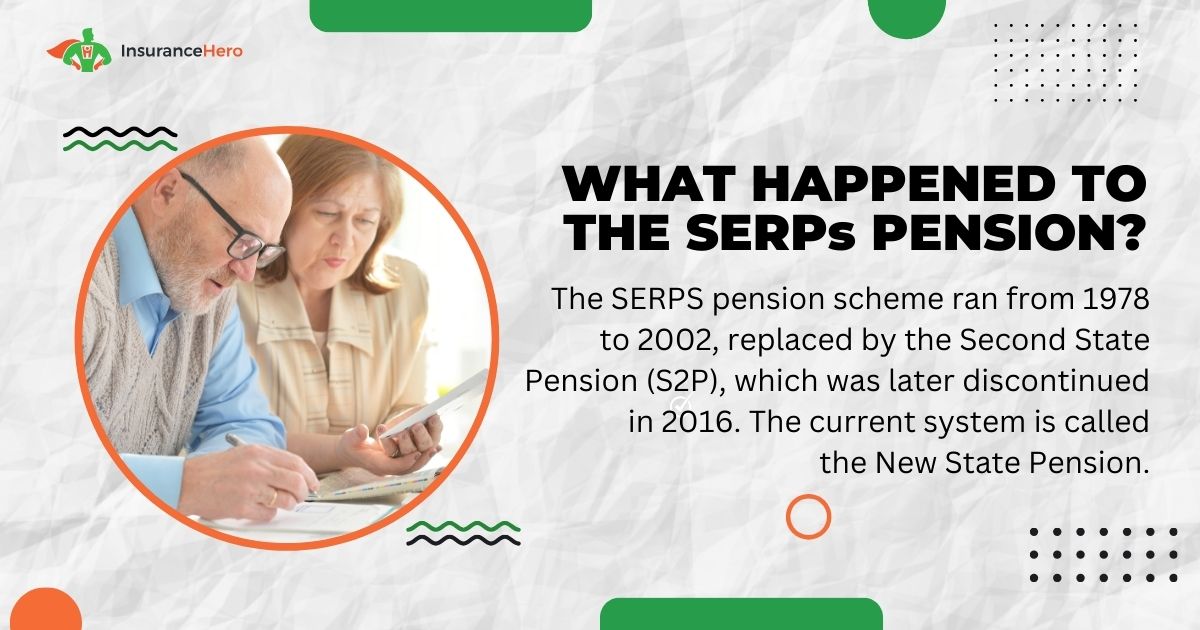
As if that wasn’t complex enough, the S2P program was cancelled in 2016 and replaced with the current state pension system, the New State Pension.
Could You Opt Out of the SERPS Pension?
Not everyone was happy to contribute to the state pension. For one reason or another, many people chose to pay into private pensions instead.
Rather than contribute even more on top of basic state pension and SERPS pension, you could opt-out – or technically, “contract out” – your SERPS pension contributions.
Essentially, this meant that you would still pay those contributions, but rather than going to SERPS, they would go to your private pension.
These protected rights pensions were ideally larger than what you would get from SERPS, and as the government did not manage them, they also had potential secondary benefits.
For example, it could also lower the amount you and your employer contributed to NIC, giving you more money in your pocket at the time.
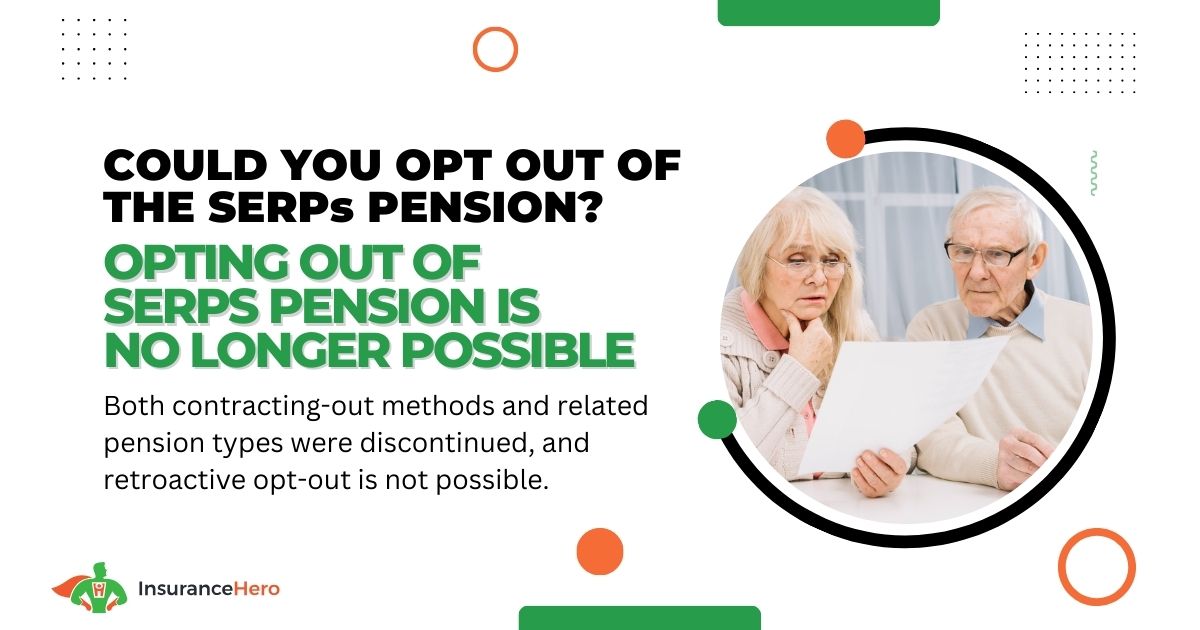
Whether or not you opted out of the SERPS pension varied. Some workplaces and employers would contract you automatically into their pension rather than SERPS. Some gave you the option to.
Some allowed it but didn’t advertise it, leaving it up to you to do your research, pick a private pension, and invest. Note that there was no way to opt out of the SERPS pension and keep the money; you had to invest it somewhere.
Overall, it cannot be easy to know if you were contracting out of your SERPS pension without keeping track of that information because the payments generally worked in the same automatic way, and it was largely seamless for workers.
If you contracted out your pension contributions, how they were governed, regulated, and handled in the intervening decade will have varied.
- If your payments were redirected to a defined contribution scheme, like a personal pension, they were labelled protected rights and often had some restrictions on how they could be used in retirement. These rolled over into standard pension benefits in 2012, when contracting out your pension payments ceased to be an option for this type of scheme.
- If your payments were redirected to a defined benefit or final salary scheme, they usually had guarantees attached to deliver at least a specific minimum level of benefit, similar to what the SERPS pension would have paid. This helped protect you from ending up with less than you would have if you had not contracted out. These may also be guaranteed minimum pensions or reference scheme test benefits. The option to contract into these schemes was ended with the new state pension in 2016.
Can you still opt out of your SERPS pension? No; both ways, you could contract out, and the type of pensions was ended. There’s no way to contract or opt out of your SERPS pension scheme retroactively.
How Do SERPS Contributions Affect Your State Pension?
If you contributed to SERPS during your working life and are now figuring out your retirement and pension payments, you may be facing a complex situation you aren’t fully aware of.
This is made all the more difficult because many employers contracted out SERPS contributions without telling you or only mentioning it in occasional statements you likely forgot or ignored.
If you reached retirement age before 6 April 2016, when the new state pension was introduced, you will receive the old essential state pension payments.
You may also be eligible to receive additional state pension payments, but the amount you may receive will depend on whether or not you were contracted out of the SERPS pension.
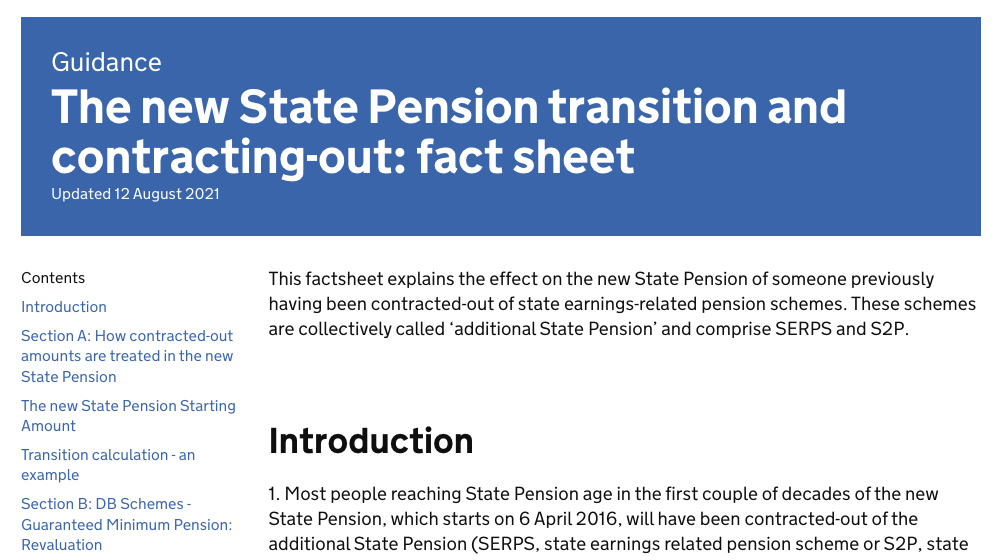
On the other hand, if you reached retirement age after 6 April 2016 – or have not yet reached retirement age – you will receive the new state pension instead. This pension may also be reduced if you were contracted out of the SERPS pension scheme.
This is meant to be a simpler system, though if you were right on the cusp of the transition, it often doesn’t feel like it.
To put it all in simpler terms:
- Everyone receives some amount of state pension.
- Everyone who pays into SERPS will receive some additional pension on top of the standard state pension.
- Everyone contracted out of the SERPS pension scheme will receive less of those additional payments – or even none – but likely receive some private pension instead. This may or may not be more than what you would otherwise have received, and it may or may not have additional rules on how it can be disbursed.
For 2025, the state pension pays £203.85 per week if you qualify for the full payment. Those who paid into SERPS may be eligible for up to an additional £204.68 per week if your contributions were maxed out. This includes both SERPS and S2P.
Can You Find an Additional Pension?
If you receive a standard pension but no additional pension, either from private sources or from the government under the additional state pension payments system, you may have an additional pension you have not claimed.
Many retirees who opted out of the SERPS pension – especially those who did so automatically due to their employer and are unaware of the fact – may be entitled to more money than they currently receive.
Fortunately, it’s relatively easy to locate these additional pensions. You can use a third-party service or the government’s official pension tracing service.
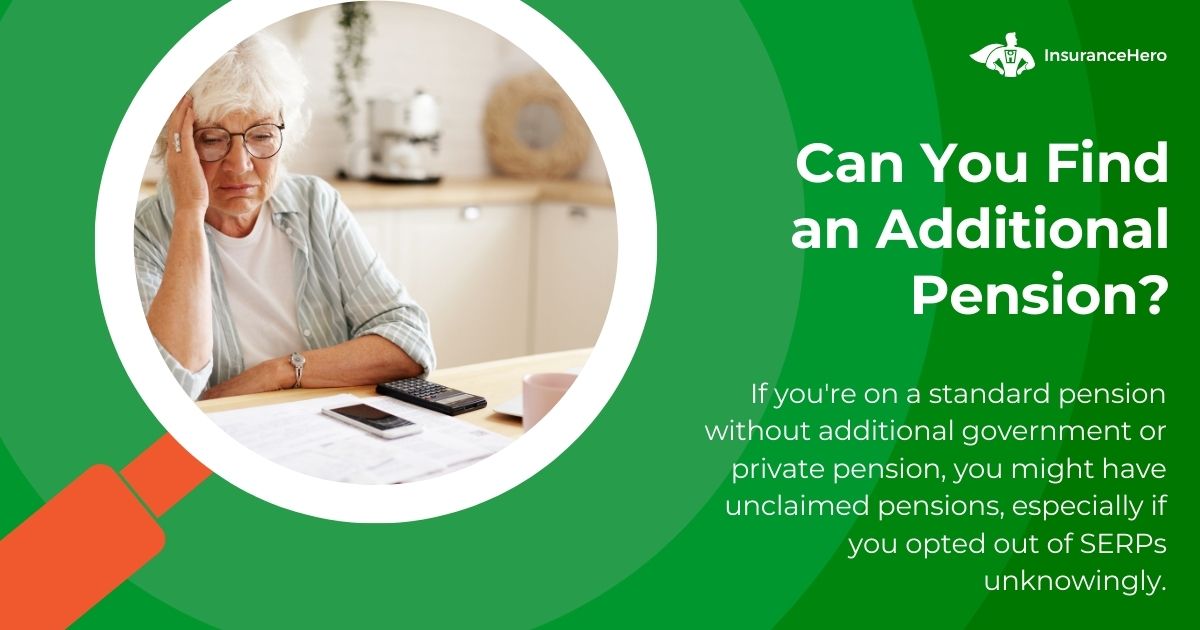
Alternatively, you can simply send a letter with your information, including your national insurance number, to:
SARS/DPU
National Insurance Contributions & Employers Office
HM Revenue and Customs
BX9 1AN
Your letter should simply state that you wish to track down any pensions the government is aware of, including your SERPS pension. HMRC will respond within 30 days and give you the information they have.
Other options to track down your pension funds, including private pensions, include:
- Contacting previous employers if they still exist. These employers should have your employment records and what happened with your pension payments. Reach out to their HR departments with your query.
- Check old paperwork. If you still have old pay slips, pension scheme booklets, or correspondence, you may be able to identify where your pension contributions went. You may even be able to find archived bank statements.
- Talk to your bank. They may be able to review old bank statements to identify old pension contributions and where they went. The name of a recipient account can then help you track down who to contact to claim a lost pension.
- Contact old pension providers. You may remember the name of a pension provider and can ask them directly if you have a pension with them that you can claim.
Identifying any extant pensions you aren’t currently receiving is just the first step to handling your finances in retirement.
Inheriting SERPS Pensions
Another consideration you may have is whether you can inherit your spouse’s SERPS pension or whether your spouse can inherit your SERPS pension.
Unfortunately, the amount that can be inherited depends on when the individual who passed was born and their gender.
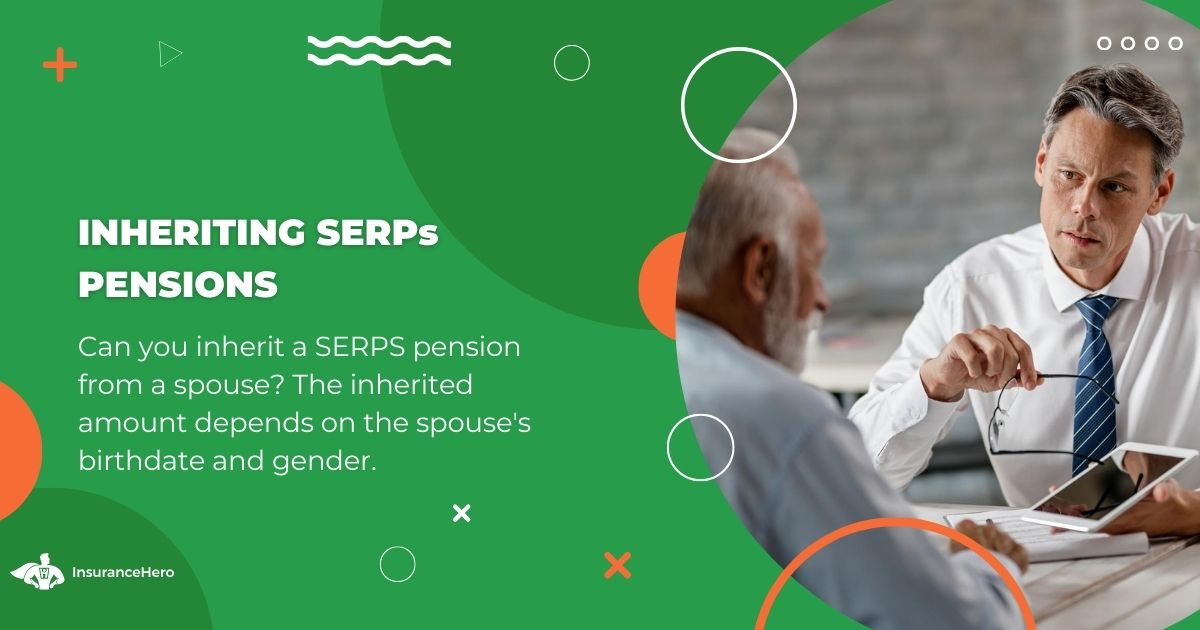
To make this easier to visualise, here is this data in a table:
| Gender | Date of Birth | Inheritance Percentage |
|---|---|---|
| Men | 5 October 1937 or earlier | 100% |
| From 6 October 1937 to 5 October 1939 | 90% | |
| From 6 October 1939 to 5 October 1941 | 80% | |
| From 6 October 1941 to 5 October 1943 | 70% | |
| From 6 October 1943 to 5 October 1945 | 60% | |
| From 6 October 1945 onwards | 50% | |
| Women | 5 October 1942 or earlier | 100% |
| From 6 October 1942 to 5 October 1944 | 90% | |
| From 6 October 1944 to 5 October 1946 | 80% | |
| From 6 October 1946 to 5 October 1948 | 70% | |
| From 6 October 1948 to 5 July 1950 | 60% | |
| From 6 July 1950 onwards | 50% |
No matter what, you can always inherit 50% of SERPS pensions.
Cashing In a SERPS Pension
Another common question is whether or not you can “cash in” or receive your SERPS pension as a lump sum rather than as an ongoing disbursement.

The simple answer is no; you cannot cash in your SERPS pension or additional state pension. It’s guaranteed-for-life income, so you receive it on an ongoing basis for as long as you live.
However, if you opted out of SERPS at some point, the private pension you receive instead may have both limitations and the option to cash it in. This varies depending on the kind of pension you’re receiving.
Planning for the Future
Since your pension only lasts as long as you’re alive, and only your spouse can inherit any of it – and even then, usually only half of it – you may be looking for other ways to provide for your family after you’re gone.
For example, if your spouse has already passed, your children don’t get to inherit your pension. The savings and other investments you have can certainly be part of your estate, but is there more you can do?
The answer here is life insurance. While it can be potentially tricky to get life insurance when you’re over 50, there are still many options available, including guaranteed cover.
With life insurance, you pay a relatively small monthly fee to buy cover for a much larger payout should you pass while you’re covered.
Those benefits can go to a spouse but also to children, other family members or other beneficiaries of your choosing.

If you want to learn more about life insurance or pensions, our life insurance blog contains excellent resources and useful information. If you don’t find an answer there, feel free to reach out and ask.
Our insurance experts are always happy to answer any questions and help you with the application process.
Speaking of applying, we make getting quotes from the country’s biggest and best insurance providers more effortless than ever.
Fill out this form, and you’ll receive quotes without the hassle of individual applications. This will make it easier to pick the best cover and protect your loved ones’ future.
Is it common for recipients of the SERPS Pension to spend their income on life insurance?
To make it simple for loved ones, British seniors and over 70’s coverage are options people consider for their funeral and other costs when they die.
Offering family the benefit of a guaranteed lump sum payment just after death is a good plan for many people who are over 50, and as people get closer to 60 or 65, the issue potentially becomes more pressing.
One of the favourite insurance companies is Saga because of their stability and long track record.
Another household name is AXA, which offers very competitive terms.
Steve Case is a seasoned professional in the UK financial services and insurance industry, with over twenty years of experience. At Insurance Hero, Steve is known for his ability to simplify complex insurance topics, making them accessible to a broad audience. His focus on clear, practical advice and customer service excellence has established him as a respected leader in the field.


